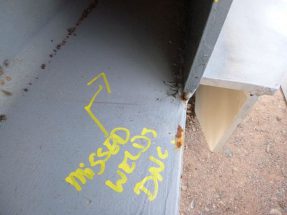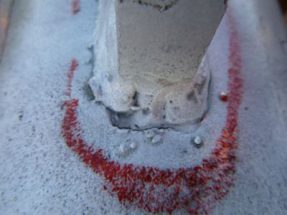[By Geoff Crittenden, chief executive, Welding Technology Institute of Australia]
Public safety is at risk unless Australian politicians legislate to enforce compliance with Australian standards for fabricated steel.
There are buildings and infrastructure across Australia manufactured from imported fabricated steel that does not meet Australian standards.
This country urgently needs laws to ensure all fabricated steel erected in Australia must be certified as compliant with the standards and the standards must be enforced.
Must we wait for deaths to occur before action is taken?
I’m not asking for special treatment, just compliance with the same set of rules that govern Australian-made steel fabrications.
A whistleblower has given me copies of documents that show a grain silo under construction in a rural Australian location, which I will not identify to protect the whistleblower, is being built from imported fabricated steel modules that are not compliant.
A WTIA-certified senior welding inspector’s report shows 10 separate items tested do not comply. Problems identified include undersize, missing and incomplete welds.

A separate qualified consultant’s visual weld inspection of the imported silo support structure found none of the welds inspected is compliant with the Australian standard, AS/NZS 1554.1:2014 (Structural Steel Welding). The consultant’s report said: “The welds are deemed unacceptable.”
Both reports include photographs that clearly show the sub-standard welds.
Risk of collapse
Despite the serious safety issues raised in these reports, my understanding is construction is proceeding with no rectification of the non-compliant welds. I am fearful this silo will collapse and could cause fatalities.
This silo is just one example of a problem that is rampant across the nation. About 85% of the 600,000 tonnes of fabricated steel imported into Australia every year is non-compliant.
Compliance with Australian standards is not mandatory and there is no way to legally force a structure’s owner to rectify shoddy workmanship.
We need a law that clearly states that no fabricated steel structure can be erected in Australia without being inspected and certified as compliant.

My colleagues and I in the steel supply chain have provided details of dangerous structures, including a footbridge between two schools in Western Australia, to government agencies but our warnings have been ignored.
The Australian Competition & Consumer Commission is a watchdog that protects children from unsafe imported toys and the like, but there is no regulation to protect the public from imported, fabricated steel that poses serious safety risks to all Australians.
In April, I gave evidence to the Senate Economics References Committee’s inquiry into the future of Australia’s steel industry and explained there was no law requiring fabricated steel to be inspected by a qualified welding inspector to ensure it met Australian welding standards.
It was obvious many committee members were unaware of that fact.
I had hoped the Senate inquiry may assist in getting the required legislation, but we must now wait for the new parliament to be formulated, so the process is delayed. The issue needs to be reinstated to the parliamentary agenda urgently.
Regulatory intervention required
There is a simple solution to stop substandard fabricated steel products being imported –government support for a regulated inspection scheme.
A two-tiered scheme with audited self-certification permitted for some low-risk fabricated products, but compulsory third-party certification for fabricated steel used in high-risk projects, including road, rail, mining and energy infrastructure, is the answer.
WTIA, as the welding industry’s peak body, can manage the scheme at no cost to the Federal Government, including facilitating independent, third-party qualified inspectors to ensure welds on imported steel are safe.

I fear governments are not taking public safety seriously. Right around Australia, there are bridges, light poles, crash barriers, road gantries and other infrastructure manufactured from imported, fabricated steel that has never been certified as being safe. They all have the potential to fail with a potential loss of life.
The Australian steel industry’s future is at risk and it is important to retain a vibrant industry but public safety must be paramount in politicians’ minds.
We need fair competition for Australia’s fabrication and steel industry but, more importantly, we must protect lives.
There is also an economic imperative. When defective welds in imported fabrications are identified, Australian workshops are frequently asked to rework them, increasing whole-of-life costs. If it’s a government project, that cost is ultimately borne by taxpayers.
The cost of additional reworking could be avoided if it were illegal to import fabricated steel without it being inspected and certified.
I am aware of unsafe structures that have been cut-up and reworked in Australian fabrication shops, but not all unsafe welds are identified because they are not checked by qualified welding inspectors when they reach Australia.
There is no doubt the steel industry is in dire straits. The moderate size of Australia’s steel industry, the rapidly declining manufacturing sector, Australia’s proximity to low-cost producers, and the de-regulated compliance environment have made it so vulnerable it is at the tipping point of viability. Without public intervention it is likely BlueScope would have closed its Port Kembla, NSW, operation, probably triggering a general collapse in the steel industry.
Arrium is in voluntary administration with debts of $4 billion and workers at its Whyalla, South Australia, steelworks face uncertain futures.
A strong steel industry is critical to the future of Australian manufacturing. Arrium’s 7,000 direct employees are just the tip of the iceberg; more than 14,000 Australians are employed in related jobs.
However, if there was a law in place to enforce the Australian standards, Arrium would not be in the strife it is in today.
Stopping rust in public policy
Public policy should recognise the importance to Australia of the steel industry and the need to maintain and repair the 2.4 billion tonnes of steel infrastructure that is crucial to the nation’s security and economy.
Defence shipbuilding, mining and energy, and civil infrastructure are all reliant on the steel industry and strategically vital to Australian interests.
Successive federal governments have withdrawn support for heavy industry and given up on the so-called ‘rust’ industries in favour of the ‘clean’ service and high-tech sectors. That strategy overlooks the steel infrastructure on which Australia relies.
The Federal Government has removed much of its ‘red tape’ regulation to try to boost productivity and profit. But there has been little regard to the fact that the world’s most powerful economies are also the most regulated.
WTIA supports a free market but sensible regulation is essential to ensure compliance reduces the risk to public safety.
About WTIA
The Welding Technology Institute of Australia (WTIA) is a national non-profit, membership-based body representing the Australian welding industry’s interests. It has 300 member companies and 1,200 individual members. WTIA facilitates technology transfers and research & development; certifies personnel; conducts education and training; and provides technical services to members.





Yes true ,let it open the eyes of the politicians to act ,cheap doesn’t mean that it can meet the quality
I am an engineer and support this 100%. In Queensland we also need a suitable policing mechanism to ensure that goods are not imported from overseas unless the engineers involved in the manufacture of those goods were registered in Queensland or were supervised by engineers registered in Queensland. If we do not do this, we create an unfair market whereby goods can be designed, manufactured and supplied from overseas, and Australian companies cannot ever hope to be competitive because they have to comply with more stringent criteria.
Unfortunately price will overrule safety until an event causing a fatality occurs. Every person should be concerned with this issue as the use of low quality steel and inferior welding could be present in any community!
This article is both misleading and confuses issues associated with design and workmanship.
Any structure no matter what is is can be built out of whatever steel specification the designer desires to use. The strength and reliability of the structure is based upon the strength of the steel being used. A design engineer will take into consideration the tensile and yield strengths of the specified material and design structures according to that material.
All welding of structures is performed using Welding Procedures that are qualified in accordance with the required standards specified by the design engineer. Australian Standards are not always used in the design of structures and pressure equipment. American standards are commonly used.
The other issue raised in this article is workmanship. It does not matter what materials are used or what standards are referenced poor workmanship is just plain poor workmanship. This has nothing to do with the structure design.
Many large projects have been built from modules built overseas using steels that have been produced to foreign standards. Projects such as Pluto Gas Project, Macedon Gas Project, Gorgon Gas Project and the Ichthys Gas Project currently under construction. All these projects are correctly designed and verified, modules are fabricated, transported to Australia and installed, commissioned and operate exactly as planned.
Mr Crittenden’s comments fly in the face of an industry that is professional, highly skilled and has great integrity.
It is noble to want to help an Australian industry. However, using rhetoric, misdirection and untruths in doing so ultimately helps no-one.
The more broader issue here is our industry is very small and noncompetitive in the world market. More effort should be put into either making our industry competitive or move our standards to use materials produced in a more competitive markets.
Thanks. Couldn’t have put it better myself.
It Is about time that our elected Government officials stood up and brought in the required legislation to make the rest of the world comply to our standards in relation to imported fabricated steel sections and structures. Australian fabricators are constantly being told that we cant compete on a global market and this is why. We will not bring our standards down and produce sub standard structures that will cause fatalities. It is not the case that it may happen but rather a case of when.
Our Government should be spending this money in our back yard rather that accepting the cheapest price and in turn sub standard work.
All politicians need to listen and take a stand against this, before they have blood on their hands.
Wake up Australia.
This problem is not just imported steelwork, I have witnessed local structural steel fabricators not following the requirements of ASNZS1554.1 with local shopping centres, putting hundreds of lives at risk on a daily basis. We must move to improve structural standards before lives are lost .
Just like foriegn manufactured products containing Asbestos been allowed to enter our ports????